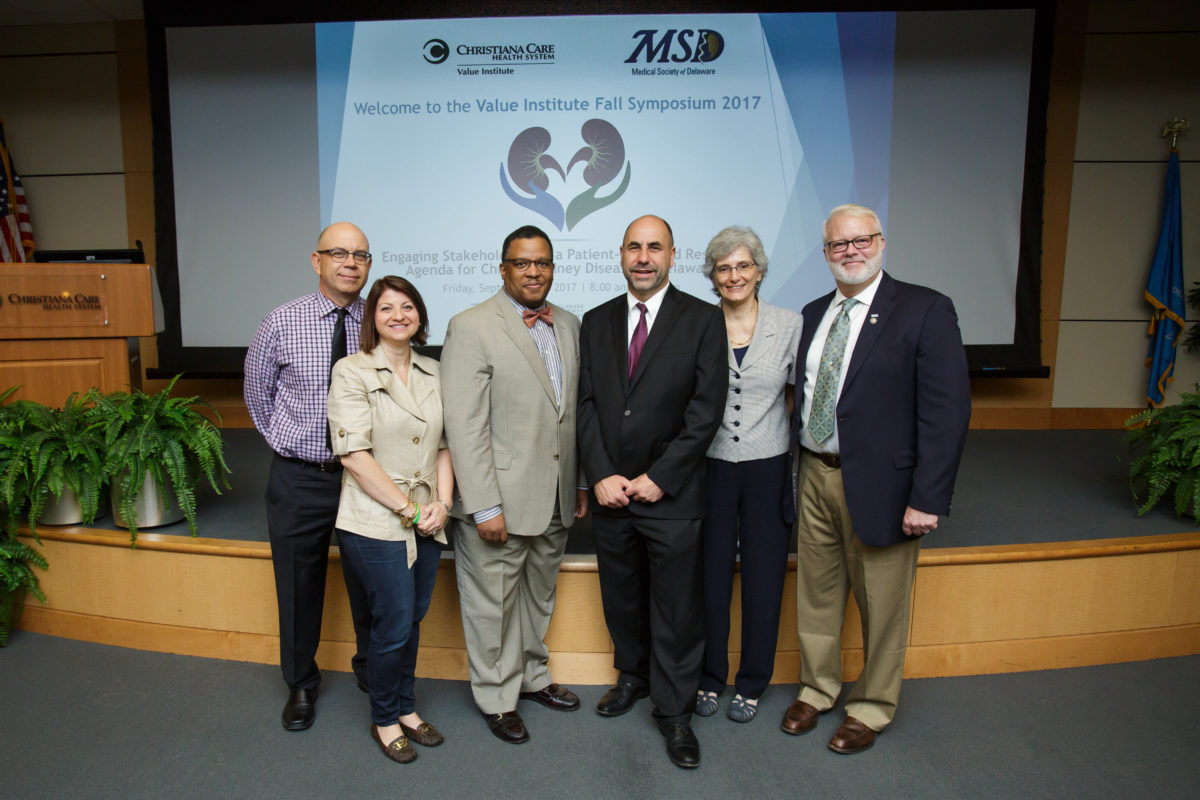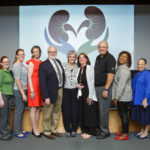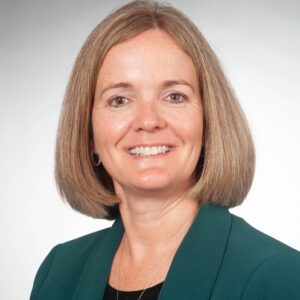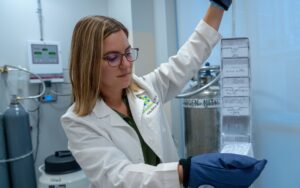Patients, caregivers, researchers and physicians shared the stage September 15 at the John H. Ammon Medical Education Center for the Christiana Care Value Institute’s Fall 2017 symposium, “Engaging Stakeholders for a Patient-Centered Agenda for Chronic Kidney Disease in Delaware.”
This event was also the latest step in a Christiana Care project of the same title, funded by the Patient-Centered Outcomes Research Institute, or PCORI, to engage patients, caregivers and health care providers in setting priorities for kidney care research.
The project is led by Claudine T. Jurkovitz, M.D., MPH, senior physician scientist at Christiana Care’s Value Institute.
“We don’t want to conduct research in a vacuum,” Dr. Jurkovitz said. “We want the community to guide our research and to tell us what they most care about.”
What patients care about and what their providers measure are often very different.
Christiana Care Health System patient Steven Scott was diagnosed with an inherited kidney disorder called polycystic kidney disease, or PKD, when he was 15. But his more recent diagnosis of kidney failure was still a shock.
Scott was thriving with a donated kidney until 2015, when an infection that started in his toe spread through his body.
“It was fine, then — boom,” he said.
Scott, who now dialyzes himself at home and is on the waiting list for a transplant at the Christiana Care Kidney Transplant Program, is a member of Partners in Research, a stakeholder team the Value Institute at Christiana Care assembled to put the patient experience at the center of kidney care.
Chronic kidney disease is a progressive illness in which the kidneys slowly lose their ability to filter blood. Because the illness is usually asymptomatic, its diagnosis tends to come as a shock, with organ failure and dialysis looming ahead.
Creating effective systems to treat patients with chronic kidney disease, which affects more than 20 million Americans, will mean seeing the kidney treatment continuum from the patient’s perspective. That will entail a renewed emphasis on education at each stage of the illness, on facilitating the transition to dialysis and on patient control and shared decision-making.
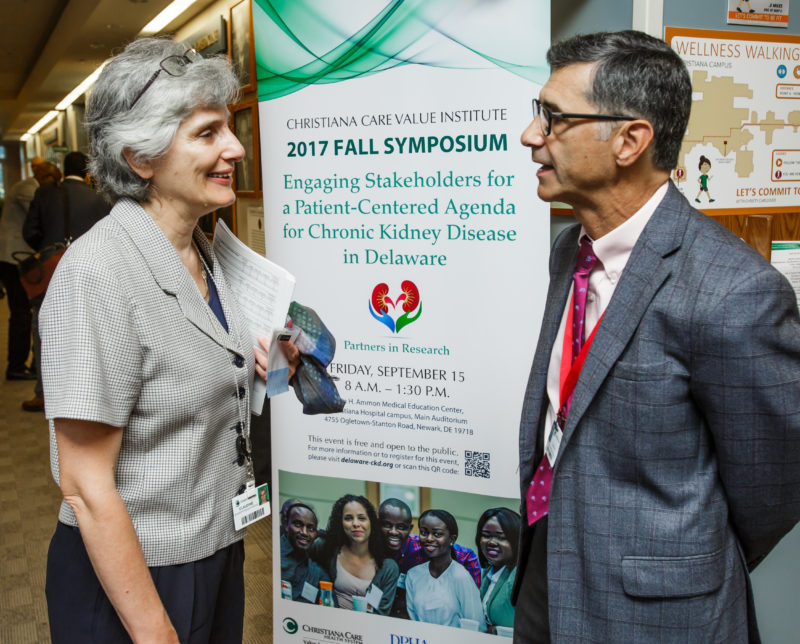
Patient preferences change care
Patient preference is not incidental to their care, said Amar D. Bansal, M.D., assistant professor of Medicine at the University of Pittsburgh Medical Center, at the symposium. It truly matters.
For example, a national survey found that more than 9 in 10 nephrologists would prefer home dialysis over in-center dialysis for themselves if their kidneys were failing. But fewer than 1 in 10 of patients are dialyzed at home. Care at home doesn’t work for every patient, but the survey suggests that what physicians recommend to patients is different from the treatment modality they would consider ideal for themselves.
This disconnect is especially jarring at the end of life, Dr. Bansal said, as dying is too often an overly intense process for those with failing kidneys. Chronic kidney disease raises difficult questions as it progresses, and patients and their doctors are often both uncomfortable talking about the future.
The result: Compared with other severe illnesses, fewer patients with chronic kidney disease have their end-of-life-care wishes known ahead of time through advance directives and other guidance.
Dr. Bansal cited data showing a rise in hospitalization, ICU care and inpatient death among patients who did not have an advanced care directive. Patients with such a directive were more likely to end dialysis and use hospice care.
One way to improve care is to integrate palliative care, called renal supportive care in this context, in the treatment of patients at every stage of the illness. Renal supportive care is aimed at the treatment of symptoms and the maintenance of quality of life rather than curing the underlying illness. For example, in renal supportive care, doctors may control blood pressure, but only to control symptoms. Hitting laboratory targets would not be a priority.
By focusing on what’s important to each patient, palliative care can help them live the life they want rather than just survive.
Even so, Dr. Bansal said, “Not doing dialysis does not mean you’ll die right away.”
One study showed no survival benefits for dialysis in patients older than 80 compared with those who did not receive it.
Finally, Dr. Bansal added that it was important to re-frame renal supportive care to make it clear that doctors are not giving up on their patients. And patients can change their mind and try dialysis.
A caregiver’s view
The symposium’s attendees experienced a poignant view of the end of life from Margaret R. Poppiti, MS, BSN, RN, whose husband passed away from PKD in 1998.
Her husband’s discontinuation of dialysis, which came after his transplant failed and his vascular access clotted, leading to worsening symptoms, was a difficult decision for Poppiti to accept. She tried in vain to convince him the clot was only a setback.
Poppiti said she eventually came to realize her husband was afraid of losing his hand — and his independence. After accepting his decision, she informed his care team, and her husband passed away surrounded by his family a short time later.
About 15 years earlier, Margaret Poppiti had graduated from the University of Delaware with a bachelor’s degree in nursing. The experience came to serve her well, personally and professionally — three of her four children inherited the illness.
Formerly a nurse in a Veterans Affairs hospital’s hemodialysis unit, Poppiti also became an advocate and is a governor-appointed member of the Delaware Chronic Renal Disease Advisory Board.
Care transitions key
Jamie A. Green, M.D., MS, a nephrologist and clinical investigator at Geisinger Health System, shared information about the PCORI-funded Prepare Now project to empower patients to have more control over their health transitions and improve their quality of life. The project includes early identification of people with kidney disease, informing patients and providers when patients are at risk, increased patient education and preparing patients for future dialysis or transplantation.
About 100,000 Americans enter end-stage renal disease each year. As their disease progresses, patients face unpredictable futures, a lack of control, new treatment decisions and insufficient support to follow through with clinical recommendations.
A major part of the study has been the creation of a database of the health system’s chronic kidney disease patients. The registry allows the team to identify the patients at higher risk of end-stage renal disease. Their risk is assessed using an equation that takes into account the patient’s age, sex, an estimate of protein in the urine and a measure of kidney function called the glomerular filtration rate, or GFR. Other elements of project include a nurse who specializes in supporting patients with advanced kidney disease, classes about living with kidney disease, decision aid with information to help patients weigh their options for renal replacement therapy, a patient values tool that guides patients to treatment options based on what matters to them, and an electronic health record alert to inform providers of treatment preferences.
When patients were asked to pick an outcome to track, they picked empowerment, Dr. Green said.
“They felt they’d lost control in managing their disease,” she said.
Exercise, adult transitions
Researchers and physicians joined patients in sharing their perspective on the illness during the symposium.
Joshua J. Zaritsky, M.D., Ph.D., chief of pediatric nephrology at Nemours/A.I. duPont Hospital, spoke about gaps in care for those transitioning between childhood and adult systems. A key finding: Chronic kidney disease may have a “subtle but persistent” effect on brain development, so adults may need extra assistance managing their care.
David G. Edwards, Ph.D., a professor in the University of Delaware’s department of kinesiology and applied physiology, spoke about his team’s exercise study in patients with kidney disease. They found exercise improved exercise capacity and increased brachial artery flow mediated dilation — low dilation is a risk factor for hypertension — though the dilation finding did not reach statistical significance. Dr. Edwards and his team at University of Delaware have also created a renal rehab program where exercise is individually tailored to patients with chronic kidney disease or undergoing dialysis and kidney transplant.
Vincent R. Skrezyna Sr., a PKD patient who received a kidney transplant in 2010, shared his story about how a positive perspective and a will to survive help him cope with his illness. He said, “I find my therapy is keeping busy and not giving up.”
Engaging patients, caregivers in Delaware
Christiana Care’s own PCORI-funded project had its first major gathering a year ago, during which patients were asked about their priorities for research. Education and coordination of care emerged as top responses, according to a thematic analysis conducted by the Value Institute.
Their next step is to convene a workgroup to find consensus about patients’ priorities in research, said Dr. Jurkovitz, the PCORI project lead.
Caregivers sometimes report difficulty coordinating care among several providers, many of whom are specialists in one aspect of health but cannot provide an overall picture.
Amy Pollock, a symposium attendee, said she’d appreciate help in looking at the big picture as she cares for her husband.
“I need somebody I can bounce facts off,” she said. “This is part of what I’m looking for,” she said. “This conference is out in front of what’s coming next.”
